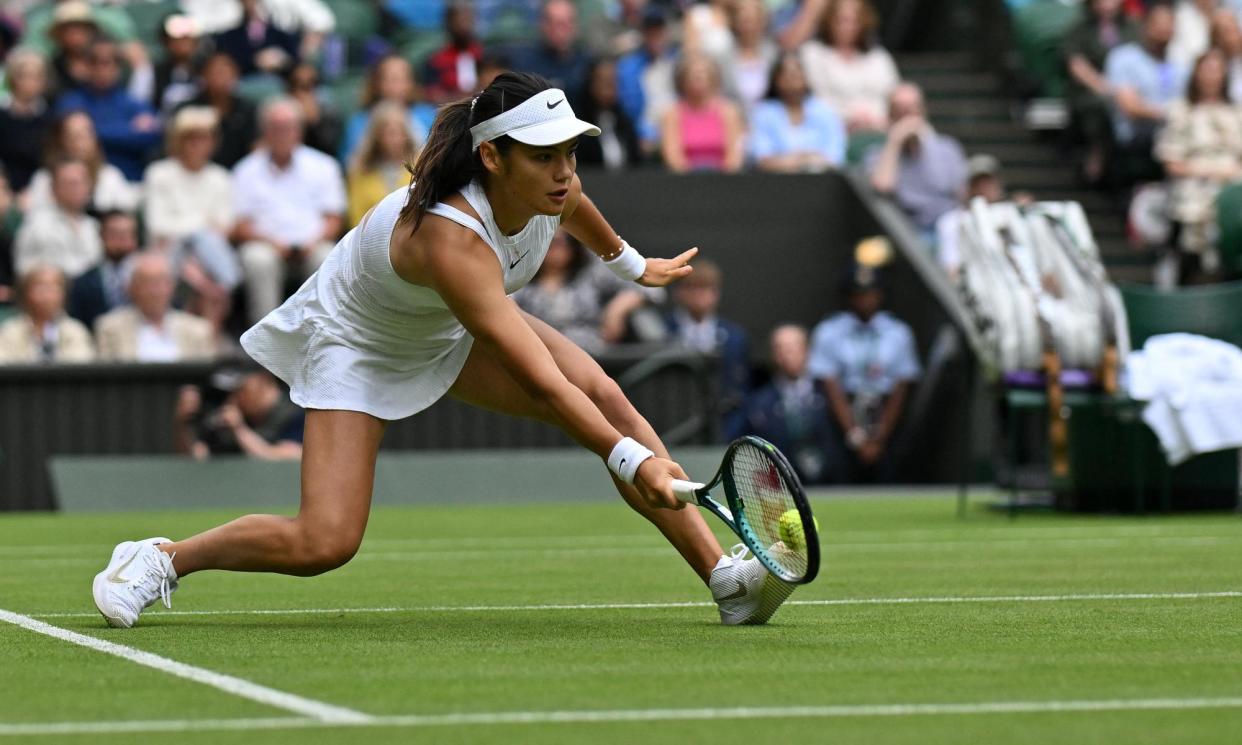Emma Raducanu inspired by England to ‘win ugly’ on her Wimbledon return

Few tennis players understand the importance of taking advantage of opportunities quite like Emma Raducanu. Her transcendent 2021 US Open triumph, after all, was an exercise in rising spectacularly to the occasion as various factors fell in her favour. Her life has never been the same since.
With the last-minute withdrawal of her scheduled first-round opponent, the 22nd seed Ekaterina Alexandrova, the opening day of her third Wimbledon potentially presented another. Raducanu walked on to Centre Court as the heavy favourite in her opening match, rather than the underdog, and although she struggled early on with the weight that comes with those expectations, the 21-year-old held firm to reach the second round with a tough 7-6 (0), 6-3 win against the lucky loser Renata Zarazúa.
During the draw ceremony on Friday, Raducanu had been handed quite a tough match against Alexandrova, a perennial top‑30 player who thrives on grass. But on Monday morning the Russian withdrew because of illness. She was replaced by Zarazúa, a resourceful but underpowered 26-year-old Mexican player who had lost a tight three-set match in the final round of qualifying.
Related: ‘I want them to see I’m happy’: Emma Raducanu relishes Wimbledon return
Although Raducanu was clearly a superior tennis player than her new opponent, there are significant challenges that come with a change of opponent on such short notice. “It’s really difficult,” Raducanu said. “I think with the notice, it was only a few hours really. When you’ve prepped since the draw came out to play one person, then it’s a complete different style of player, as well, you’ve worked on things specific. But I think it’s all about just competing at the end of the day.”
Sloane Stephens, who faced a similar challenge after an even later withdrawal from Victoria Azarenka, expressed the same sentiment in a different way following her win against Elsa Jacquemot. “Change of an opponent an hour before the match is not the vibes,” she said. “Do not recommend. Zero out of 10.”
Standing at just 5ft 3in, Zarazúa has had to figure out different ways to win tennis matches against the countless taller, stronger opponents she encounters. From the beginning of the match, she showed how tricky she can be to play by dragging Raducanu into protracted exchanges with her movement and shot discipline while also mixing up the pace and trajectory of her shots.
Having been ready for a matchup against a powerful, flat-hitting ball striker, Raducanu was suddenly charged with dictating the vast majority of rallies and trying to keep them short. Raducanu prefers to redirect pace rather than constantly generate her own, and she struggled in the early exchanges. She simply could not hit through Zarazúa, whose steady helping of slices and drop shots pulled Raducanu into the forecourt and other uncomfortable positions around the court.
Even though Raducanu broke serve first to establish a 4-2 lead, for much of the opening set she could not shake off her tension. She particularly struggled to impose herself with her return of serve, usually one of her biggest weapons, and put so little pressure on Zarazúa’s fragile serve. But Raducanu held on until the tie-break, serving well when necessary and, with the set on the line, she was at her most animated and energised as she forced herself inside the baseline and dominated to take the set.
Having secured the opening set, Raducanu gradually opened up her shoulders, finally pressuring the Mexican’s serve as she took the only break of the second set at 4-2 with some forceful returning before holding firm in her service games until the end.
“In a way it was a little bit to do with my performance,” Raducanu said. “I don’t think it was perfect tennis. It wasn’t clean, beautiful, ball striking. It was just about managing the opponent and managing the fight and the circumstances.”
Raducanu compared her gritty win to England’s victory against Slovakia in Euro 2024 the day beforehand. “I was nervous, I think everyone could see that in my tennis but at the end of the day you have to do whatever it takes to get over the line. Honestly, watching the football last night, it was winning ugly – it all counts.
“Last night, I had a feeling that they would still turn it around. The people I was watching with, I was like, I don’t know. It was getting to like 93rd minute. I have a feeling. Then Jude [Bellingham] hit that insane goal.
“Today I used it as motivation. It doesn’t need to be beautiful, it doesn’t need to be perfect. As long as you get through the opening rounds, you give yourself another chance to play better. For circumstances to align, as long as you’re still in the tournament, you keep giving yourself that chance.”
A year after missing out on Wimbledon and eight months after having surgeries on her wrists and ankle, Raducanu has returned to the All England Club with an encouraging win. By holding her nerve, she has also essentially taken the 22nd seed’s place in the draw and she will next face Elise Mertens, who reached the second round earlier with a 2-6, 6-2, 6-4 victory against Nao Hibino.
“As I said in the first press conference, I’d be over the moon if I won my first round here,” Raducanu said. “And I really am. I feel just the joy to be on-site, the joy to be part of the buzz. I’m really just enjoying myself.
“I think that each match I win should be celebrated a lot. I think for me, because I know how hard matches are to win, to come by. I think that now having had a few wins under my belt, I’m like really cherishing every single one because I know how difficult it is to be on the flip side of it.”


